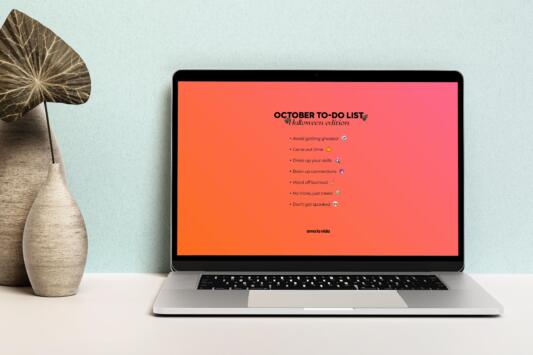3 Ways to Improve Your Mental Health
Burnout, Health Coaching, Life Coaching, Mental Health, Mindset & Mindfulness

Over the last few years, the conversation around mental health has been shifting from silent and stigmatized to open and commercialized and everything in between. I, for one, am so glad we’re starting to talk about mental health. It’s not just about being healthy or struggling with mental illness, there is a big area in the middle that tends to be forgotten.
Today, we’re going to talk about improving your mental health the way you would improve your physical health if you’re already a relatively healthy individual. How do you show up to the “mental gym” and what sorts of things do you do to flex muscles that may be a little weak?
Let’s dive in!
Note: Mental health is on a spectrum and before we dive into some ways you can improve and care for your mental health, we want to call out that sometimes the best answer to this is to seek help. If you feel like you need professional help with your mental health, please call a mental health provider or seek out immediate help through the SAMHSA National Help Hotline.
1. Lower Your Expectations
Every time I say this to my clients, they laugh. Lower my expectations? Why? Well, odds are that your expectations of yourself are way too high. Much higher than the expectations you hold of others or anyone else holds of you. So, lower them.
We expect ourselves to give our 100% ALL of the time and if we don’t, we beat ourselves up for not doing enough or being enough. So I say, lower your expectations. A good way to frame this is by coming up with your goal and then breaking it down into three categories.
- Your first category is your expectation of yourself when you’re feeling your best – this can be your “ideal”
- The second category is your expectation of yourself if something else were to come up – a busy week, a last-minute deadline, or a head cold
- And the final category is your expectation of yourself if something major happens – a family emergency or a more serious illness like the flu or covid
Now, that third category is your new goal. Anything beyond that, categories 2 and 1, is exceeding your expectations, not meeting them. Anything you do that’s the third category or more, you celebrate! If you don’t meet that level of expectation, you reflect: what happened, what got in the way, what type of support do I need?
In none of these circumstances, do you ever beat yourself up. Got it?
2. Stay Present
“If you are depressed you are living in the past. If you are anxious you live in the future. But if you are at peace you are in the present”
Lao Tzu
Living in the moment or mindfulness has been and still is a hot topic of conversation. We all know we should do it, but how do we do it when our minds are reeling, going a million miles a minute?
One of my favorite mindfulness practices is a practice called “Orienting.” It’s simple and you can do it anywhere, anytime. I encourage you to have scheduled moments in which you orient (set an alarm or match it up to a thing you do every day like drinking coffee, eating lunch, or brushing your teeth).
Before starting this exercise, pay attention to your breathing. Take slow, deep, long breaths – in through your nose and out through your mouth. Breathe deeply for about 3-5 breaths and then go through the following steps:
5: Acknowledge FIVE things you see around you.
It can be anything, don’t worry about judging it or bringing any memories or stories in. Don’t start thinking “I see my room, it’s so messy and there is clutter and I should’ve cleaned it” Simply acknowledge 5 things.
Ex. I see a pen. I see a plant. I see a computer. I see a tree. I see a couch.
4: Acknowledge FOUR things you can touch around you.
It could be your hair, a pillow, or the ground under your feet. Again, no judgment or stories just state facts.
Ex. I can feel the ground on my feet, it feels cold and solid. I feel the pillow in my hand, it is soft and fuzzy.
3: Acknowledge THREE things you hear.
This could be any external sound around you or near you.
Ex. I can hear the whirring of a helicopter. The sizzle of a pan. I hear my dog snoring.
2: Acknowledge TWO things you can smell.
Maybe you are in your office and smell pencils, or maybe you are in your kitchen and smell food. If you need to take a brief walk to find a scent you could smell soap in your bathroom, or nature outside.
Ex. I smell my coffee, it is nutty and strong. I smell my shampoo, it smells like coconut.
1: Acknowledge ONE thing you can taste.
What does the inside of your mouth taste like—gum, coffee, or the sandwich from lunch?
Ex. I can taste my toothpaste.
Once you acknowledge these things, bring your focus back to your breath. How do you feel now? Where do you feel those feelings in your body?
You can also do this exercise in the moment when you feel anxiety, stress, or any other intense emotion come in. This simple exercise gets you out of your thinking brain into your feeling body and hopefully supports you in de-escalating emotions that may be too intense or negatively affecting you in your day to day.
3. Move Your Body
Moving our bodies has proven benefits for our minds and bodies. It helps release endorphins, move emotions through our bodies, strengthens the mind-body connection, and get us out of our heads.
Like everything, there are helpful and harmful ways to do this and for the sake of improving your mental health, we want to focus today on intuitive movement, what it means, and how to embrace it.
Intuitive movement is an approach to exercise that encourages people to trust and listen to their bodies. Its aim is to remove the old idea that exercise is to “shrink, sculpt, or grow your body” and rather focus on the connection and nourishment that movement offers you.
Moving intuitively means:
- Feeling more connected with your body
- Checking in and moving differently on different days
- Allowing days for rest
- Enjoy the movement or exercise
- Respecting your limits
While intuitive movement means just that and it can look different for everyone. Here are some examples of what this could look like for you:
- Rolling your shoulders back when you feel tension in your neck
- Dancing it out when you feel nervous
- Going on a walk in the middle of the day to reset
- Stretching in the morning if your body feels stiff
Moving your body in an intuitive way encourages you to tune in, listen, and respect your body and your mind, and the practice of moving intuitively helps nurture a loving and caring relationship with yourself. That loving relationship with yourself is a much needed connection while you’re facing mental health challenges or feeling blue or stressed.
Less Is More And Slow Is Best
Many of my clients come to our sessions looking to add things: more hours in the day, productivity structures and routines, health and wellness goals, new jobs, and more responsibility. Our society and culture has glamorized the hustle and celebrate sleeping little or caffeinating too much. However, those habits can wreak havoc on our mental and physical well-being, and we usually don’t catch them until we’re burnt out and overwhelmed.
As you move through these three tips, remember their ultimate goal is to slow down and reconnect. Reconnect with who you are, what matters to you, and what your needs are. Give these a try and share your favorites with us, or reach out for additional support if you want to work with a life coach to personalize your mental wellness and personal growth plan!


